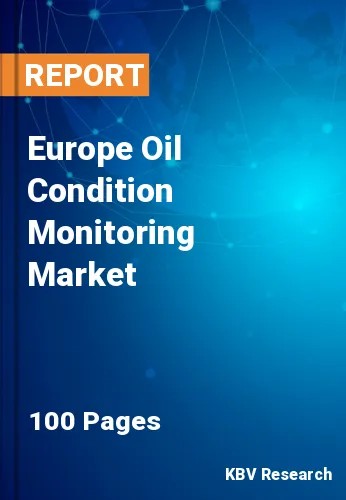The Europe Oil Condition Monitoring Market would witness market growth of 7.3% CAGR during the forecast period (2023-2029).
The condition of transmission oil, engine oil, power steering fluid, and brake fluid is tracked via oil condition monitoring in the transportation industry. This procedure aims to stop any component deterioration or failure resulting in a breakdown. In addition, oil condition monitoring enables the detection of impurities such as water, metal particles, fuel dilution, and glycol. In many industrial applications, oil condition monitoring is used. Compressor oil, hydraulic fluid, gearbox oil, transformer oil, and turbine oil are often used as industrial materials. OCM aids in locating and analyzing any abnormalities in these oils that could lead to machinery breakdown and reduce output. Additionally, it aids in enhancing the caliber of goods and maximizing machine performance.
Oil and gas production procedures are incredibly intricate, and even the smallest adjustment in one procedure can affect other steps further along the production line. The basic goals of oil condition monitoring are to identify, treat, and head off these problems. Spotting any possible issues early on also aids in production optimization. Various sensors are used by oil condition monitoring systems to assess the fluid and oil conditions.
The European Union (EU) has set a lofty goal of expanding regional railway networks. By 2030, it wants to double the proportion of freight rail traffic to cut CO2 emissions from the transportation industry and relieve traffic on busy roads. The region has a strong road transportation and logistics system. Given the current preference for truck transportation, the freight rail sector must make significant performance changes to offer a viable alternative.
The UK's transportation systems adhere to highly strict safety regulations. Due to a sustained drop in accident rates, the UK's railways continue to have the best safety record among the ten main European railways. As a result of all these initiatives, the regional governments give special attention to maintaining their transport systems. This care includes periodically checking the efficacy of various oils and lubricants used in the engines. Therefore, the regional demand for oil condition monitoring will grow in the coming years, propelling the market's growth.
The Germany market dominated the Europe Oil Condition Monitoring Market by Country in 2022; thereby, achieving a market value of $78.8 million by 2029. The UK market is estimated to grow at a CAGR of 6.4% during (2023 - 2029). Additionally, The France market would register a CAGR of 8% during (2023 - 2029).
Based on Product Type, the market is segmented into Engine, Gear Systems, Turbine, Hydraulic Systems and Compressor. Based on Sampling Type, the market is segmented into Off-site Sampling and On-site Sampling. Based on End User, the market is segmented into Oil & Gas, Industrial, Power Generation, Transportation and Mining. Based on countries, the market is segmented into Germany, UK, France, Russia, Spain, Italy, and Rest of Europe.
Free Valuable Insights: The Worldwide Oil Condition Monitoring Market is Projected to reach USD 1.2 Billion by 2029, at a CAGR of 7.7%
The market research report covers the analysis of key stake holders of the market. Key companies profiled in the report include Parker Hannifin Corporation, General Electric Company, Bureau Veritas S.A., Intertek Group PLC, SGS S.A., Eaton Corporation PLC, BP p.l.c., TotalEnergies SE, Shell plc, Chevron Corporation.
By Product Type
By Sampling Type
By End User
By Country
Our team of dedicated experts can provide you with attractive expansion opportunities for your business.

